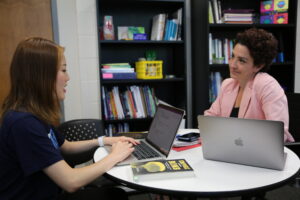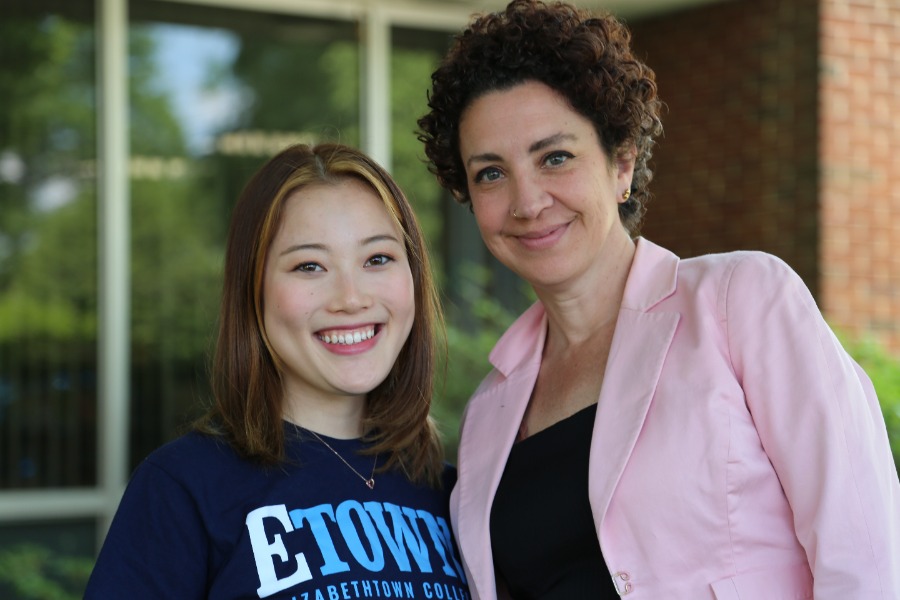Elizabethtown College International Business major Misaki Yamaguchi ’24 is studying the relationship between the United States and Japan through the lens of the events of World War II. By examining documents, statistics, and data from both countries, Misaki is striving to raise awareness about the fading memories of WWII, while also aiming to present her final conclusions at a future regional conference.
The independent student research and collaboration with an Etown faculty mentor is part of the Summer Creative Arts and Research Program (SCARP) program.
Title of Research
Peacebuilding Since World War II: Relations Between Japan and the US
Student Researcher
Misaki Yamaguchi ’24 (International Business)
Faculty Mentor
Shannon Hailey-Mize, Associate Professor of Education and Interim Director of the Center for Global Understanding and Peacemaking
What are you researching?
Misaki: My research project deep dives into historical tragedy during World War II, especially on events that happened between Japan and the U.S. One of the most significant events worldwide and between Japan and the U.S. is the atomic bombings of Hiroshima and Nagasaki. We examine what led to this tragic event and how it has changed the global landscape and the relationship between Japan and the U.S. while promoting peacebuilding through learning from the past.
This study reviews existing information, performs analysis of international relations data, conducts interviews, compares different perspectives on history, and explores the international treaties, reconciliation, business trades, and agreements that have shaped the relationship between the two countries.
Why did you choose this topic?
Misaki: This project highlights my academic interests and relates to my International Business major, International Studies minor, my role as a Peace and Global Scholar, and as an international student from Japan. It allows me to output my knowledge and learnings from the academic courses into outside research, spend time outside of courses to acquire critical comprehension, and design a series of experiences that engage with global apprehension and peacemaking.
 There is a vital global issue that the trace and experience of war are becoming more history than memory as the population of wartime decreases. Both populations from wartime are declining as time goes on, and 20 years from now, the wartime population will be close to 0%. Therefore, it’s important to act and spread the awareness of history to younger generations.
There is a vital global issue that the trace and experience of war are becoming more history than memory as the population of wartime decreases. Both populations from wartime are declining as time goes on, and 20 years from now, the wartime population will be close to 0%. Therefore, it’s important to act and spread the awareness of history to younger generations.
Recognition and evaluation of history not only allow us to understand how the various aspects of societies and people worked in the past, but also help us to appreciate cultures, traditions, identities, people, and ideas while finding the meaningful present.
What is the most interesting aspect of this research?
Misaki: The most interesting aspect of this research is to find out the truth on history, different perspectives from two counties, and why the atomic bombings happened. By reading articles in both Japanese and English, I discovered how the two counties’ different perspectives on history were created by some assumptions and miscommunication with each other.
How has your mentor helped you?
Misaki: My mentor has formed a close relationship with me and has an open mind that helps me to communicate with her easily. We meet to discuss the development of the research and information I have collected, go over the requirements for the research, and check on questions, concerns, and review what I have been doing that week.
Hear from the faculty mentor – Shannon Hailey-Mize
“Misaki took the initiative to design this SCARP project according to her interests and to align with her goals as a CGUP Peace and Global Scholar,” Hailey-Mize said. “She has been the driving force behind the research questions and the progression of the work.
“This is my first time participating in SCARP, so I am excited about extending scholarly work and student development over the summer months. I was intrigued by the opportunity to have dedicated time for mentoring and scholarly pursuits.”

